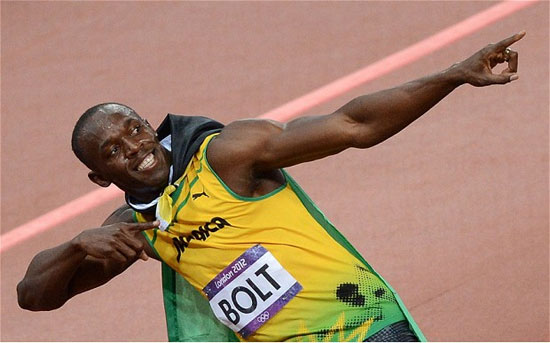The secret of the fastest runners of the planet
A new study, Usain Bolt, a Jamaican athlete named "the fastest man on the planet", generated 50 times as much energy as a flying bullet during a 100 meter run of record breaking. world.
Scientists analyzed the physical aspects of the 2009 World Championships athletics tournament, where Usain Bolt set a new world record at a 100-meter run for 9.58 seconds. They discovered that Jamaica's "lightning bolt" reached a maximum speed of 43.5 km / h as well as creating an average force of 815.8 newtons (N).
So, Bolt produced 81.58 kJ of energy when running, while a bullet left the barrel of a handgun with a diameter of 11.2mm only produced 1.6 kJ.
However, unlike a bullet that can reach 1.609km / h, Bolt's massive physique (he is 1m95 tall) means that 92% of the energy he produces is consumed in the fight against air resistance.

Usain Bolt
According to the researchers, Bolt must create an unusually large amount of energy in order to achieve a 100-meter run time fast for a world record because of less dynamic air than the average physique. He achieved a maximum production of 2,619.5 Watt within 0.89 seconds when only running at half the maximum speed. This shows that resistance has affected the acceleration of "the fastest man in the world".
Research co-author Jorge Hernandez has published in the European Journal of Physics, emphasizing: "The calculated drag coefficient has highlighted Bolt's extraordinary ability. You can still break many centuries. Continues despite the physique of less aerodynamic than others.
Today, it is very difficult to break records, even just a few percent of a second because athletes have to run as hard as they can to resist big resistance, increasing proportional to their speed. This is the "physical barrier" caused by conditions on the Earth. Of course, if Bolt runs on a planet with a less dense atmosphere than Earth, he can create even more startling records. "
The team claims that their equations can be used to calculate the effect of forward wind, which can vary between races and significantly reduce running time.
They also compared Bolt's performance on a 100-meter run in Berlin with a previous record time at the Beijing Olympics a year earlier (9.69 seconds). In Beijing, Jamaica's "lightning bolt" played without the help of downwind winds, but in Berlin there was a downward wind with a speed of 3.24 km / h.
- Latest discovery of the fastest runners on the planet
- The hottest and fastest planet
- Secret helps Usain Bolt run the fastest in the world
- Which animal is the fastest on the planet?
- The secret to escaping the fastest predatory species on the planet
- 10 most interesting things about Venus
- The secret was unexpectedly behind the speed of jaguar: 100km / h
- Revealing 'secret weapon' to hunt NASA's new planet
- When the world's fastest people race in a zero gravity environment
- Revealing the secret of the fastest plane in the world
- The most secret military bases on the planet
- The fastest spacecraft on the planet
 'Fine laughs' - Scary and painful torture in ancient times
'Fine laughs' - Scary and painful torture in ancient times The sequence of numbers 142857 of the Egyptian pyramids is known as the strangest number in the world - Why?
The sequence of numbers 142857 of the Egyptian pyramids is known as the strangest number in the world - Why? Miracle behind the world's largest stone Buddha statue
Miracle behind the world's largest stone Buddha statue What is alum?
What is alum?